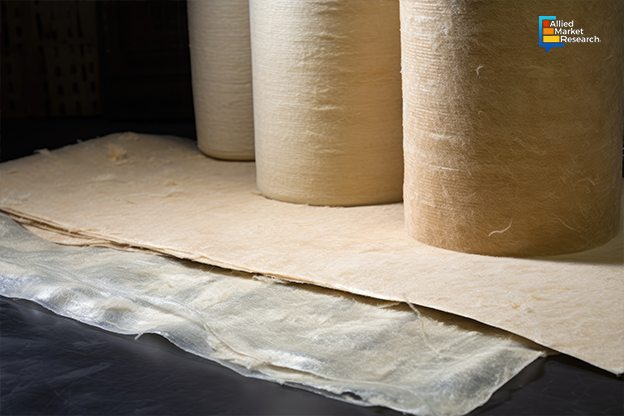How Is Investment in Glass Mat Technology Meeting the Sustainability Goal of Multiple Industries?

25 Jul
2024
Highlight
- Introduction
- Sustainable nature of glass mats
- Applicability of glass mats in the aerospace
- Evolving landscape of the Asia-Pacific glass mat industry
Glass mat is widely utilized in construction to reinforce materials, especially in the manufacturing of gypsum wallboards and cement boards.The production process involves randomly arranging fine glass fibers into a mat structure and saturating it with resin to bind the fibers together. This creates a lightweight yet robust material ideal for applications demanding high strength-to-weight ratios, including reinforcing composites, insulation, and soundproofing materials.
Furthermore, glass mats enhance structural integrity and durability, which boosts vehicle safety and longevity. With strict regulations on vehicle emissions and fuel economy enforced globally, automakers are developing innovative solutions to meet these standards. Incorporating glass mats into automobile production helps meet these requirements by reducing vehicle weight and improving fuel efficiency, leading to lower carbon emissions and reducing their environmental impact. The glass mat industry is expected to showcase a noteworthy CAGR of 7.7% by 2032.
A green solution for advanced infrastructural needs
There is a growing focus on sustainable and energy-efficient construction practices. Glass mats are increasingly used in green building projects because of their superior thermal and acoustic insulation properties, which help reduce energy consumption. Additionally, manufacturers are investigating eco-friendly materials and production techniques to minimize environmental impact. Often produced from recycled glass, glass mats contribute to resource conservation by reducing the need for new materials. Their manufacturing process includes a significant amount of recycled content, aligning with sustainability goals.
Innovations in binder technology for glass mats are concentrating on minimizing harmful emissions by transitioning from traditional formaldehyde-based binders to more environmentally friendly alternatives. This shift reflects the increasing focus on sustainability in the construction industry. Their resistance to moisture, mold, and fire enhances the durability and lifespan of structures, leading to lower lifecycle impacts. This increased durability means fewer resources are required for maintenance and replacement.
The evolution of glass mat technology in aerospace
Advances in glass mat technology have a major impact on various aerospace applications, especially in lightweighting, thermal and acoustic insulation, and composite materials. New manufacturing techniques, such as wet-laid and spray-up technologies, enable the creation of thinner and more uniform glass mats, further boosting their lightweight characteristics. Lighter aircraft components lead to improved fuel efficiency and reduced emissions for meeting environmental regulations and sustainability targets in the aerospace sector.
Glass mats with improved thermal insulation and acoustic dampening properties are used in aerospace interiors and components. These materials play a key role in regulating cabin temperatures and reducing noise levels, thereby enhancing passenger comfort and safety. Innovations in binder technology, including the creation of eco-friendly alternatives, have further boosted the performance of glass mats in high-temperature and high-stress aerospace environments.
A look at the transformative landscape of the Asia-Pacific glass mat industry
The Asia-Pacific region is undergoing rapid urbanization, with more people relocating to cities. This shift is fueling a higher demand for residential, commercial, and infrastructure construction, thereby increasing the need for materials such as glass mats for reinforcement and insulation. Advancements in manufacturing processes, such as the transition from open mold to closed mold applications, are improving the efficiency and quality of glass mat production. This technological evolution is anticipated to boost adoption across a range of industries.
Moreover, the Asia-Pacific region is home to several leading companies in the glass mat industry, promoting local production and innovation. This presence is contributing significantly to the growth of the industry.
China Jushi established the world’s first zero-carbon intelligent manufacturing base for glass fiber
China Jushi began construction of its Huai'an Lianshui Zero-Carbon Glass Fiber Manufacturing Base in February 2023. The development will include a new 358,000-square-meter integrated factory building and additional facilities. The new production lines will feature advanced technologies, including high-melting-rate tank structures, high-performance glass formulations, matrix high-power electrical boosting, and three-dimensional oxy-fuel combustion.
In summary, glass mat technology is revolutionizing multiple industries through its strength, durability, and sustainability. Its role in enhancing structural integrity, reducing environmental impact, and advancing aerospace innovation highlights its growing significance. Moreover, advanced manufacturing techniques are expected to optimize the efficiency and versatility of these mats in the upcoming years.
Contact our experts for a detailed regional and opportunity analysis of the glass mat market!

Koyel Ghosh
Author’s Bio- Koyel Ghosh is a blogger with a strong passion and enjoys writing in miscellaneous domains, as she believes it lets her explore a wide variety of niches. She has an innate interest in creativity and enjoys experimenting with different writing styles. A writer who never stops imagining, she has been serving the corporate industry for the last five years.
Hot-Dip Galvanized Steel Industry: Highlighting the Impact of Novel Technologies on Fabrication Businesses
Avenue: Entire Library membership of Allied Market Research Reports at your disposal
- Avenue is an innovative subscription-based online report database.
- Avail an online access to the entire library of syndicated reports on more than 2,000 niche industries and company profiles on more than 12,000 firms across 11 domains.
- A cost-effective model tailored for entrepreneurs, investors, and students & researchers at universities.
- Request customizations, suggest new reports, and avail analyst support as per your requirements.
- Get an access to the library of reports at any time from any device and anywhere.
Related Post
-
How are Submarine Cables Transforming Global Connectivity with Enhanced User Experience?
-
Endoscopy Procedures: Transformations in Techniques and Applications
-
AI-Powered Video Analytics: How the Product Actually Works for enterprises
-
Painting Robots: Transforming Precision Coating and Creative Applications
-
Innovations in Pharmacovigilance Systems Advancing Patient Safety
-
Understanding Edge Security: Keeping Data Safe Near the Source
-
Exploring the Use and Advancements of 3D Laser Scanners in Professional Applications
-
Reinforcing Industrial Controls with Smarter Tools and Training








